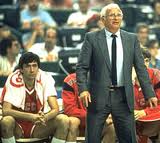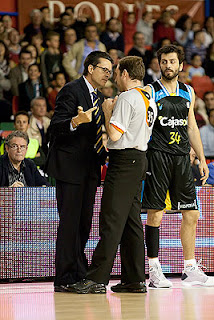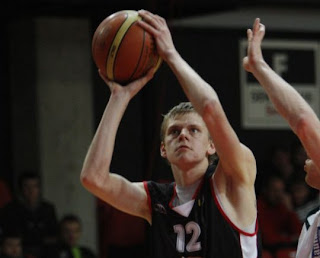This is a guest blog by Ed Odeven, staff writer of The Japan Times. Basketball Telegraph got the permission to publish the article by the author.
Zeljko Pavlicevic, 59, has been called one of the top 20 coaches in European basketball history. He guided croatian Cibona Zagreb to the 1986 Euroleague title. He repeated the feat in 1991, coaching croatian Split, also from the former Yugoslavia, to the Euroleague title. He has also coached Ferrol and Vitoria, a pair of spanish (ACB league) teams, and served as the bench boss for Panathinaikos Athens, for which he earned a Greek Cup crown in '93. Pavlicevic's career has also included time as the Croatian National team's technical director. He led the Japan National squad from 2003-06, serving as the team's head coach during the 2006 FIBA World Championship in Japan.
As you prepare for Shimane's season opener against the Saitama Broncos, what are the team's top objectives for 2010/11?
Look, because the Shimane is a new club, with no background and no history, it's difficult to say how we'll perform in the opener. But the most important thing is to develop a good club - everyone. The club is not only a team, but also the front office, the fans, the boosters. To be a stable club is the most important thing for all of us. It's important to find good foreigners, even if we don't have very big success this season. We can be very active to search and find guys with talent, but between them there may not be good chemistry. Maybe we are lucky this year and we can find good guys and good players, but as we build for the second season and future seasons that foundation will help us to produce winning results.
So, in other words, team unity and stability will be vital for the team's success?
Yes, that's right. As the first coach in Shimane in the history of the club, I wish that the club will have a long, long life. That is my main expectation.
Is it too early to say what you want to be the Susanoo Magic's trademark for the 2010/11 season?
I'm still waiting to add players, so it's early. But, yes, so many have asked the same question before. When some coaches don't have what they would consider the right type of players, they refuse to adjust and change their system, only trying to play one kind of game.. I try to stay flexible and change our strategy, using different tactics to fit the players we have.
How would you describe the energy of Shimane's team staff and the attitude of the community as it prepares for the club's first season?
The strong support in Shimane is not surprising. The entire city is behind the club, and that is something that is very important for me and all the players. We have up to 5,000 boosters now; that is a big number. I think we will have even more. That is very good, I think.
As a league with a number of teams in rural areas and the countryside, how important is it for teams such as Shimane to develop a strong local following and to be indentified as part of the fabric of the community?
Shimane is a nice small city, and I was in Tokyo for four years. It is one of the greatest cities in the world, but I like this city, it's a nice city. In Europe, soccer is the big sport in the big cities, except for some big cities like Barcelona and Madrid. Basketball, especially in Italy, is mostly in small cities, such as those with a population of 200,000 and 300,000; the same in Spain, where you have so many small cities. With the BJ-League expansion plan - to have 24 teams as the final number - you have to start to catch the fans from the countryside and small cities, small cities like Akita and Shimane, where people can support one good basketball club.
Based on your experiences following the JBL over the years and attending the BJ-League Final Four in May at Ariake Colosseum, what are your overall impressions of both leagues? And how has the BJ-League changed since it was established in 2005 with six teams?
The Final Four game me good impressions, the Final game (Hamamatsu Higashimikawa vs. Osaka) was good, and the semifinals were good. I will say from the beginning that I respect the JBL because they are the old league, but they are always staying with eight teams. In a big country like Japan, with 120 million people, it's a big number, so I hope in the future there will be one big league. Season after season, there is better organization in the BJ-League and the players are improving.. I think in the future, not so many from the university ranks can come to the JBL because of only eight teams, but they will come to the BJ-League and it has a very good future for growth.
Analyzing the overall state of basketball in Japan, not just at the pro level, how would you characterize the sport here?
Well, more education and improvements are needed. Regarding basic fundamentals, some players don't know them. They need to know more basic concepts and develop fundamentals at different levels.
Do you believe it's wise for the BJ-League to use a salary cap - reportedly Y77 million this season - to limit spending?
That is a smart move. It helps clubs be stable; they don't want to spend too much money. The league knows some clubs cannot survive (without the cap). But I think with the salary cap it is difficult to find some very talented foreigners, because you also have to spend a bigger amount with four or five foreigners on your teams. You can spend 80 per cent (of your foreign-player budget) on one player, but then it's limited to the others. If you have a higher salary cap, it can be a bigger problem and less chance of stability for the clubs. Season after season, you can increase the salary cap little by little. And after a few years, the BJ-League can find better foreigners, more expensive foreigners.
What have been the biggest compliments you've received since becoming a head coach in 1984? And what accomplishments are you most proud of from your distinguished career?
There have been big successes - titles, trophies and recognition - and so many nice things came and I don't remember everything that many nice people said. But one thing that's special for me is when some of these coaches, through Facebook and other online sites, communicate with me or write nice things, you can see them, catch up with them, after a long, long time. They say, for exemple, they really respect your job and follow your style, like this style, etc.
About my proudest achievements, it begins with my first (European Cup) title in 1986 with Cibona Zagreb with Drazen Petrovic, and I was not very old, so it was really special for me.
In 1991, Pop 84 Split began the season with three new starters after winning consecutive titles, and it was my first year with the team. Dino Radja had left (and later played for the Boston Celtics) and another starter (guard Dusko Ivanovic) also departed. People didn't believe that team would reach the Final Four again. But we won the European Cup. I'm very proud of that team.
Also I am very proud of the Japan National team and how we did at the 2006 World Championship. Based on the National team's history, it really hasn't had big results in basketball, but we exceeded our own expectations. It was really very exciting.. We played very good basketball and nearly advanced to the second round.
You've coached some great players - Tony Kukoc, for exemple - throughout your career and also coached many average players. Do you generally adjust the way you speak to challenge players of different ability levels?
That is a very important question. And also if you always tell players, you don't know this, you don't know that, or say, he's always bad..how can he do things himself? My point off the court is to give a player the confidence to believe he can do much better than he can really do.
So confidence is a big part of your coaching message?
Yes. If he is 60 percent confident, I need to get him to be 70 or 80 percent sure he can do something. Some coaches always cut players down, down, down. So how will they believe? Each player on the team, I need to push him to give him the belief he can do almost everything, even if I know he can't do it. This is very important.
There are some very young new coaches in the BJ-League now and established bench bosses, including Hamamatsu coach Kazuo Nakamura and new Tokyo coach Bob Hill, who has led four NBA teams during his long career. Do you think the league's older coaches will be helpful role models for the up-and-coming sideline supervisors?
I respect the decision of the young coaches to pursue this career. It can be a tough career. Some players will be older than the young coaches and that can be difficult. They will make mistakes, but they will also accomplish some good things. I know, I was a head coach at 34. You only live once, so it's a good challenge. Some coaches only want to go to top teams with a history of winning trophies. But for me if I can build the Shimane team and if the team is happy because I am here, that will give me satisfaction. When you are young, money is more important, but as you get older, there are other thoughts too. Sometimes it's not only about money. There's also pride and it's a personal challenge. My good friend Nakamura (who is 69), he appears young in his style. He's very aggressive and he has very good intelligence. He's young and energetic. Bob Hill is a big name and like me he came here to promote the sport.. It may be good for promotion of the BJ-League but also very good for these young coaches because of the experience of Bob Hill and Nakamura and my experience.
This is something we have done for a long time.






















